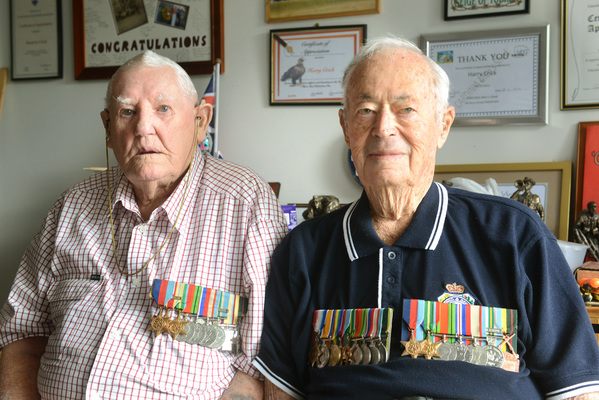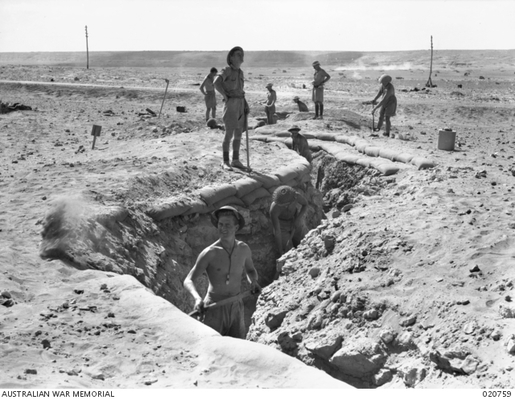
By ANEEKA SIMONIS
“TOBRUK was a place where you might be here tomorrow, the next day maybe not. That was the feeling given. If you got to see tomorrow, it was another happy day.”
Harry Crick, 97, of Pakenham, is one of the last remaining ‘Rats of Tobruk’ – and now represents the Pakenham RSL alongside fellow war vet Norman Joseph, 90.
For eight long months, Mr Crick lived in the desert trenches of the North African campaign, fighting off German and Italian troops along the frontline through multiple air raids, tank attacks and constant shelling.
It was the toughest combat he took part in during his World War II service – and 75 years on, he can recall each attack in fine detail including the “horrible” sirens of the German Stuka dive-bombers during the 1941 siege.
“They would fly over every afternoon. The siren made a horrible noise,” he said.
“It would drop bombs mainly intending on hitting the harbour where all the ships were.”
The defence of the harbour was paramount to Australian and Allied troops.
But Tobruk’s brave defenders – made up of about 14,000 Australian soldiers – refused to give in or retreat.
Mr Crick, who served in the 2/24th Battalion, remembered one time when an overhead German aircraft littered the desert battleground with leaflets urging them to give up.
“The Germans dropped leaflets saying ‘Why don’t you surrender? You can’t get anywhere’. We used them as toilet paper,” he said.
It was their strong will to defend the front line which earned the hero soldiers their name.
Nazi propagandist Lord Haw Haw (William Joyce) derided the tenacious defenders as ’rats’ during the defence – but it only served to strengthen Australian soldiers who embraced it as an ironic compliment.
“He would talk on the radio at night time saying ‘Dig your holes, dig deeper for tomorrow because more bombers are coming’. Nobody took any notice of him,” Mr Crick recalled.
The Rats of Tobruk became known and feared for their skillful patrolling, particularly at night, according to war reports.
During Mr Crick’s service in the war, he was a ‘runner’ – delivering messages on foot between units.
It was a job he hated, knowing he was often delivering the news soldiers would have to fight in a battle they might never return from.
“I used to hate doing that because sometimes, some of the fellas wouldn’t come back,” he said.
But it was a job he believes spared him from being taken prisoner by German troops who stormed into Australian territory in tanks.
“There was this one night in Tobruk I was sent to battalion headquarters before dusk with a message.
“(Meanwhile) the frontline became overrun with Germans. They brought their tanks and drove them over the top of the trenches.
“They couldn’t do anything.
“They took a hell of a lot of prisoners.
“That’s where I believe in luck. I would have been taken prisoner.”
Mr Crick stayed the duration of the siege, later fighting in the first battle of El Alamein and conflict in Papua New Guinea.
Papua New Guinea was one of the many battlegrounds Mr Joseph served in during his military career, beginning at age 15.
He enlisted from the shores of Sydney in 1941, fighting in many conflicts in the Middle East and Pacific – for months alongside his father, Ben Joseph, in Papua New Guinea, decades on from his service in Gallipoli in the World War I.
He served as part of the 18th Brigade.
The siege of Tobruk began on 10 April, 1941 and was finally lifted on 10 December.
A 75th anniversary service was held on Sunday 10 April at the Shine of Remembrance in Melbourne to honour servicemen.







